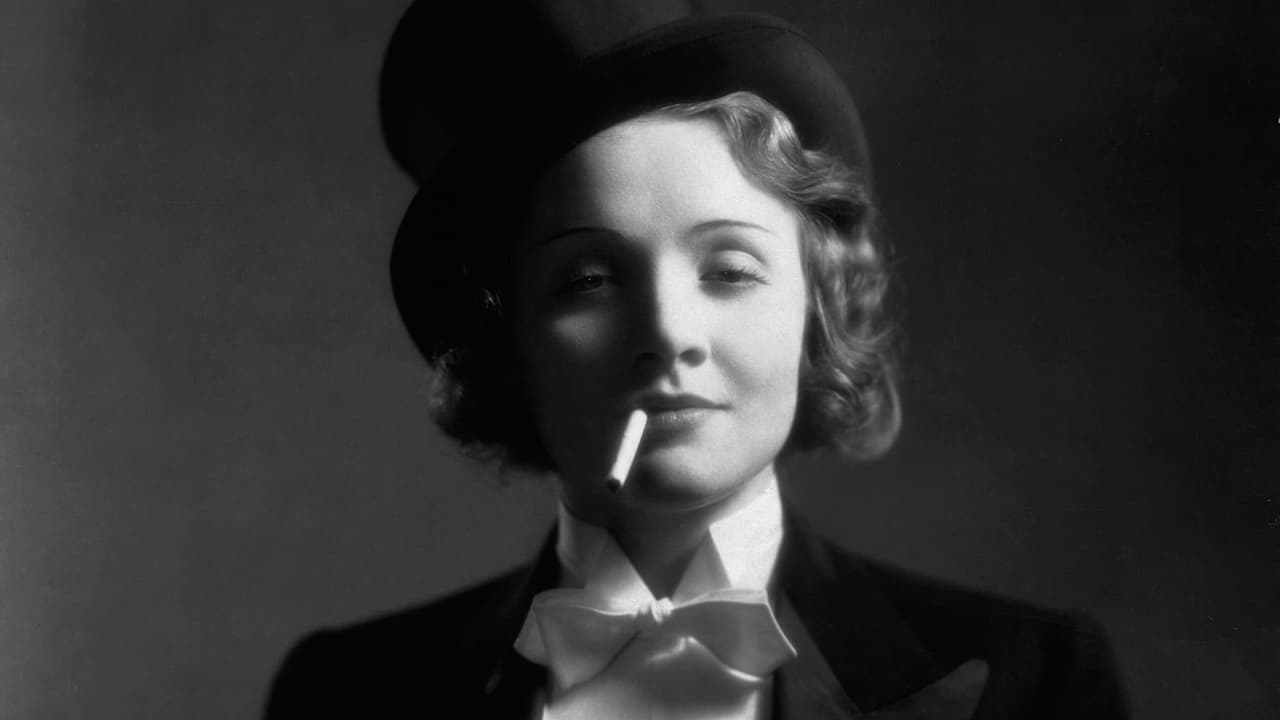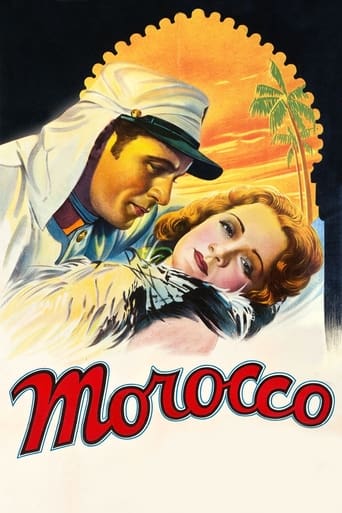

Overrated
... View MoreHighly Overrated But Still Good
... View MoreIn other words,this film is a surreal ride.
... View MoreOne of the most extraordinary films you will see this year. Take that as you want.
... View MoreA cabaret singer (Marlene Dietrich) and a Legionnaire (Gary Cooper) fall in love, but their relationship is complicated by the results of his womanizing and due to the appearance of a rich man who wants her for himself.According to Robert Osborne of Turner Classic Movies, Cooper and von Sternberg did not get along. Von Sternberg filmed so as to make Cooper look up at Dietrich, emphasizing her at his expense. Cooper complained to his studio bosses and got it stopped. When Dietrich came to the US, von Sternberg welcomed her with gifts including a green Rolls-Royce Phantom II which featured in some scenes of "Morocco".As I understand it, Dietrich was already a star in Germany, and this was her big transition to Hollywood. Clearly someone noticed because they gave her an Oscar nomination and her scene in the coattails is now considered iconic (and even a bit racy). World, meet Marlene Dietrich!
... View MoreThe sole reason for me to watch this black and white classic is Marlene Dietrich, courtesy of the fact that it gave her the one and only Oscar-nomination in her entire career. And it is a delight to find out Gary Cooper is her co-star (gosh he is really at his prime, particularly in his army uniform), and the director at helm is Josef von Sternberg, Ms. Dietrich's long-time collaborator, no wonder even the heartthrob Cooper does not stand any chance to steal her thunder (so is a very underused Adolphe Menjou).Truly, this film is all about Marlene, her neutral sexuality is exuding all over the screen with the top hat and the tuxedo when she renders her mesmerising performance as the chanteuse in the cabaret (not to mention the notorious girl-girl kiss scene, it must be a sensational topic at that time, it was 1930!). At the same time her quaint flair as a woman trapped in love but too proud to admit it in front of her beloved man has its momentum to propel the film with its uneven plot. I may be too harsh, the film is made 82 years ago, in the wake of talkie era, so I readjust my original rating from 4 to 5. The patchwork of its very much run-of-the-mill script and camera movements (there are some rather frivolous shots of battle scenes which might fall into the laughingstock notch) are pretty much dated and ruefully, Ms. Dietrich cannot single-handedly save the film (her then English accent is still a bit grating, hope I'm not the only one to say that), the entire film doesn't sell the story in a fully credible structure, many details are being sidelined while the sentimentality is lingering on and on, or perhaps it is just another film fails to connect with when time mercilessly passes by. But last but not the least, its classic way of sending the "dare to love" message is warm and encourage, the final bravura of pursuing her lover in the march has its own merit in that time, if I may divine.
... View MoreMarlene Dietrich was one of the original film sirens and brilliant actresses in film history. In this film, she plays a singer from Paris in Morocco where she falls in love with two men. The film was directed by Josef Von Sternberg, one of her favorites. The film was filmed in 1930 in the early years of the talking film industry. This film also displayed a rare kiss between Dietrich in a man's outfit kissing a woman in the audience early in the film. It's rare in 1930 but the kiss was shocking then. It's done well without overdoing it. Dietrich's performance earned her an Academy Award nomination for Best Actress and it was well-earned. Gary Cooper played Tom Brown, a member of the Foreign Legion. She falls in love with him although the film's script could have been stronger. Regardless, just watching Marlene Dietrich is a joy in any film. She brings so much to the screen in her facial expressions more than words could ever say.
... View MoreAfter making remarkable naturalistic masterpieces as "Underworld", "The Docks of New York" and "The Blue Angel", Josef von Sternberg made "Morocco", but instead of the rigorous visual and thematic baroquism that worked so well in his own "The Last Command", he opted for the cheap Hollywood exoticism of long cinematic tradition, before and after this African adventure. First of the American films he made with Marlene Dietrich, "Morocco" is one of those heavily static products made during the first years of sound cinema, when the use of the new equipments was shy, and registering sound prevented cameras from moving as freely as they did during the silent period. But aside these technical restrictions, "Morocco" is a melodrama in the limits of idiocy, with a sure foot on the land of ridiculousness; it is a cult film more than anything else, with Marlene flaunting boas and male attire, sending lesbian messages and singing nonsense, while a young and bony Gary Cooper and Adolphe Menjou in his typical Frenchified impersonation, revere her, as those who selected this dubious entry to the National Film Registry. Watch it only as curio.
... View More